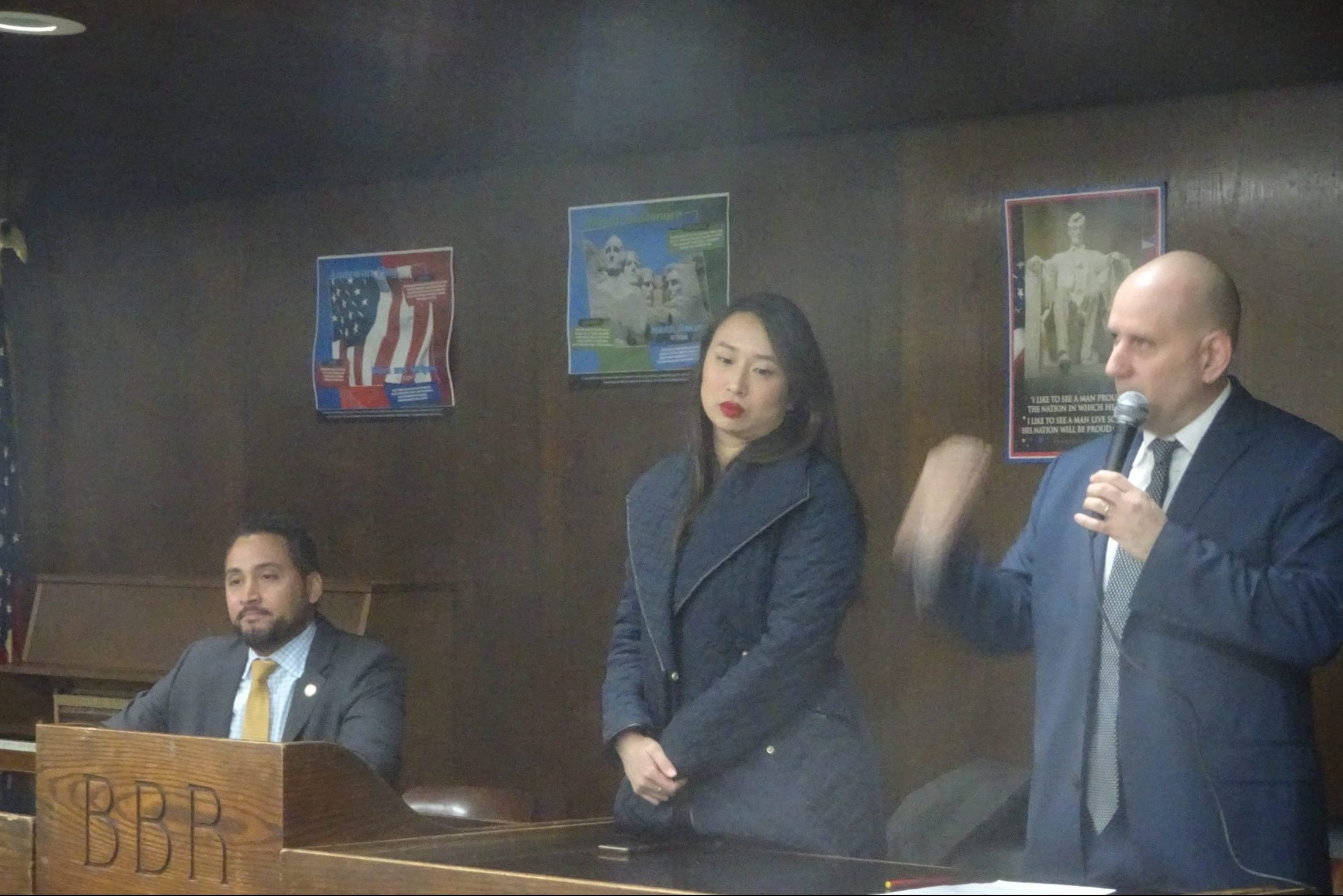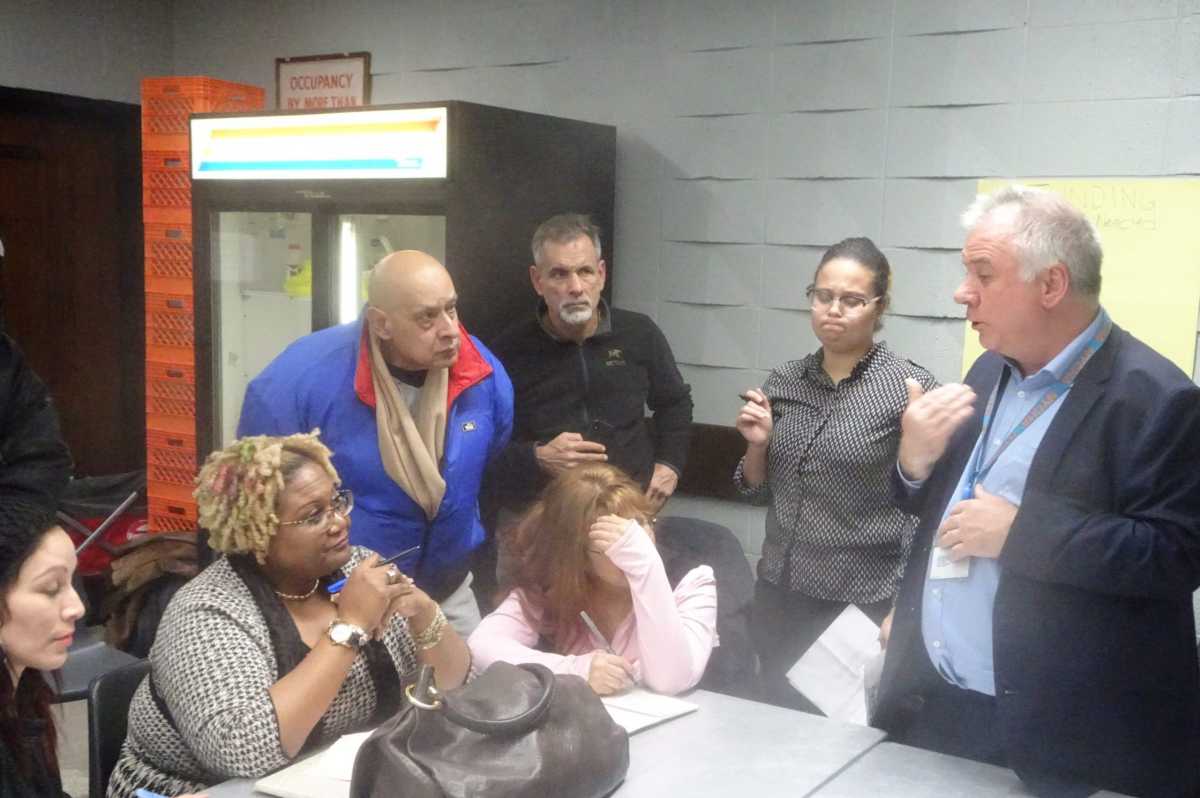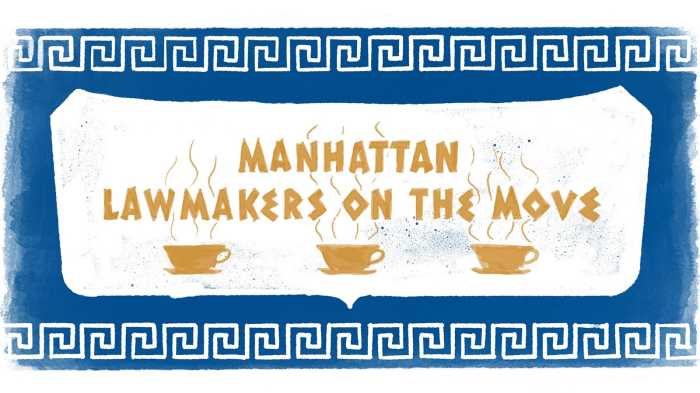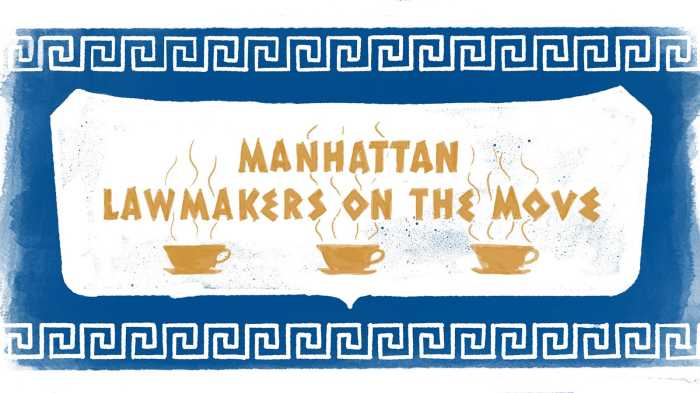Brian Honan, Vice President of Intergovernmental Relations at NYCHA, could only state his name and title at last night’s town hall before someone from the audience interrupted him.
“Sorry to interrupt, but what does [your title] mean?” asked an audience member. “If you’re just a liaison for NYCHA, I am not interested in that. I’ve been part of NYCHA since 1987, and I’ve seen the deterioration and heard the lip service. What is really happening? What is really going to come to the table after we give you the same thing we’ve been giving you for the last ten years?”
Last night, Assemblymember Harvey Epstein (D-Lower East Side, East Village) hosted a town hall meeting on how to improve NYCHA. The meeting took place at 6 p.m. last night at the Boys & Girls Republic, 888 East 6th St. He was accompanied by Assemblymembers Yuh-Line Niou (D-Chinatown, Financial District), Deborah Glick (D-East Village, West Village), Robert Rodriguez (D-East Harlem) and Carmen De La Rosa (D-Upper Manhattan), as well as State Senator Brian Kavanagh (D-Lower East Side).
The electeds acknowledged that the state of NYCHA is inexcusable, and has been for quite some time. Each of them had received numerous complaints from their constituents about life-threatening mold, gas outages and rat infestations, among other problems.
“We all know that in the City, we have a crisis with public housing,” said Epstein. “400,000 residents living in dilapidated conditions, caused by failures on the federal, state and city level. We need to change how NYCHA functions.”

Earlier this month, the federal monitor for NYCHA approved a plan to spend $450 million worth of state money on elevator and boiler upgrades across 35 NYCHA complexes. Yuh-Line Niou noted that she and her colleagues had to struggle for years to secure that funding – which still won’t be nearly enough to solve all of NYCHA’s problems.
“The money was long overdue, and it’s still not enough money to make the fixes that we need to see,” said Niou. “We need over $60 billion in funding to fix NYCHA, and we need to do that now. We need to fully fund our public housing.”
Niou went on to credit Representative Nydia Velázquez (D-LES, Brooklyn, Queens) for introducing the Public Housing Emergency Response Act, which would allocated $70 billion in funding towards public housing.
During the latter half of the meeting, the attendees splintered off into groups to brainstorm ideas for improving NYCHA. Some attendees suggested organizing rent strikes in order to secure the funding that the developments need. Others suggested cutting corporate welfare and rerouting that money towards public housing. During this time, the electeds and NYCHA representatives went from table to table to engage the attendees directly.
“We will not promise to have every single answer,” said Brian Honan. “But we will promise to get back to the sponsors with the answers and get back to you, as well. ‘I don’t know’ doesn’t mean, ‘I don’t know how to do my job’. It means I’m being honest with you, and it means that I’ll get back to you as soon as I can.”
But the attendees were skeptical that their input would actually change anything. Several pointed out that they had attended similar meetings several times in the past few years, to no effect. Others asserted that in order to see real change, NYCHA has to be rebuilt from the ground up.
“The definition of insanity is to keep doing the same thing over and over, expecting different results,” said one attendee. “Obviously, this is not our first rodeo. My question to you is, why has no one, not one person, stood up and said that we need to restructure NYCHA from the ground up? You’re going to give NYCHA $70 billion so that they can bungle it like they’ve bungled all the rest of their money? Until NYCHA is completely restructured, I don’t think anything you’ve told me amounts to a hill of beans.”
And until that happens, NYCHA tenants have to continue living in squalor. NYCHA resident Doretta Walker demanded to know how she can hold NYCHA authorities accountable when they deny her access to basic utilities.
“How do we hold them accountable for how long they’re gonna leave us without gas?” asked Walker. “Thanksgiving is coming up; we can’t cook Thanksgiving dinner. When Christmas comes around, we can’t do Christmas. So what’s gonna happen?”
At the end of the meeting, Epstein reiterated his acknowledgement of NYCHA’s unacceptable conditions, and his commitment to rectifying them.
“There are so many questions we have to answer and problems we have to solve,” said Epstein. “This plan to fix NYCHA isn’t going to happen overnight. Assemblywoman Niou, Assemblywoman De La Rosa, Assemblywoman Glick, and the entire Manhattan Delegation is going to do something about it. We’re gonna fight to do something. This is really important; you need to hold us accountable, and hold NYCHA accountable.”








